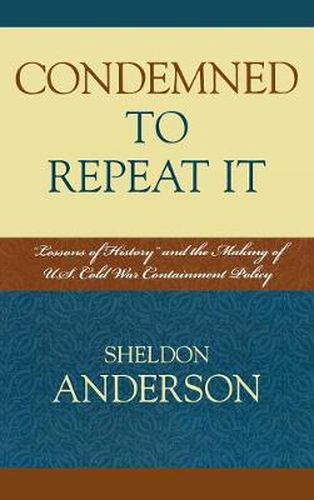Readings Newsletter
Become a Readings Member to make your shopping experience even easier.
Sign in or sign up for free!
You’re not far away from qualifying for FREE standard shipping within Australia
You’ve qualified for FREE standard shipping within Australia
The cart is loading…






Foreign policymakers frequently invoke historical analogies to make and justify decisions in the belief that history teaches particular lessons. Yet historians and philosophers are not so sure. Arthur Schlesinger once wrote that, Santayana’s aphorism must be reversed; too often it is those who can remember the past who are condemned to repeat it.
Condemned to Repeat It addresses six historical myths that underwrote U.S. containment policy during the Cold War. The collapse of the Soviet empire seemed to confirm the wisdom of U.S. containment policy and these lessons of history as universal truths that still influence U.S. foreign policy thinking today. 1) A European states system based on realism, balance-of-power, raison d'etat, and great power diplomacy did not keep a ‘long peace’ from 1815 to 1914. 2) The punitive Versailles Treaty with Germany did not cause the rise of Adolf Hitler and World War Two. 3) Erroneous analogies to Neville Chamberlain’s failed attempt to avert war at Munich in 1938 worked its way into virtually every debate on the use of force to stop communist aggression during the Cold War. 4) Franklin Roosevelt did not give away Eastern Europe to Stalin at the Yalta Conference in 1945. The conventional version of Yalta as a deal to divide Europe is fictional. 5) U.S. containment policy did not create a stable bi-polar world, and like the nineteenth-century balance-of-power system, preserve another long peace for forty-five years after World War Two. 6) Ronald Reagan’s military build-up and ideological crusade against the Soviet Union did not cause the fall of communism in 1989. Mikhail Gorbachev gave up the Soviet Empire. The Reagan ‘victory school’ version of the end of the Cold War has given American leaders the dubious belief that the United States alone possesses the power to create a liberal democratic, free market world order. Condemned to Repeat It appeals to anyone with an interest in the legacy of the Cold War, including undergraduate students.
$9.00 standard shipping within Australia
FREE standard shipping within Australia for orders over $100.00
Express & International shipping calculated at checkout
Foreign policymakers frequently invoke historical analogies to make and justify decisions in the belief that history teaches particular lessons. Yet historians and philosophers are not so sure. Arthur Schlesinger once wrote that, Santayana’s aphorism must be reversed; too often it is those who can remember the past who are condemned to repeat it.
Condemned to Repeat It addresses six historical myths that underwrote U.S. containment policy during the Cold War. The collapse of the Soviet empire seemed to confirm the wisdom of U.S. containment policy and these lessons of history as universal truths that still influence U.S. foreign policy thinking today. 1) A European states system based on realism, balance-of-power, raison d'etat, and great power diplomacy did not keep a ‘long peace’ from 1815 to 1914. 2) The punitive Versailles Treaty with Germany did not cause the rise of Adolf Hitler and World War Two. 3) Erroneous analogies to Neville Chamberlain’s failed attempt to avert war at Munich in 1938 worked its way into virtually every debate on the use of force to stop communist aggression during the Cold War. 4) Franklin Roosevelt did not give away Eastern Europe to Stalin at the Yalta Conference in 1945. The conventional version of Yalta as a deal to divide Europe is fictional. 5) U.S. containment policy did not create a stable bi-polar world, and like the nineteenth-century balance-of-power system, preserve another long peace for forty-five years after World War Two. 6) Ronald Reagan’s military build-up and ideological crusade against the Soviet Union did not cause the fall of communism in 1989. Mikhail Gorbachev gave up the Soviet Empire. The Reagan ‘victory school’ version of the end of the Cold War has given American leaders the dubious belief that the United States alone possesses the power to create a liberal democratic, free market world order. Condemned to Repeat It appeals to anyone with an interest in the legacy of the Cold War, including undergraduate students.